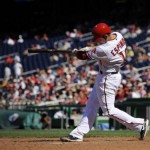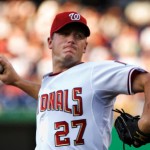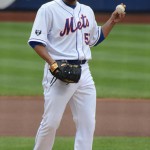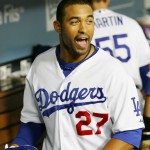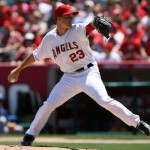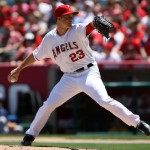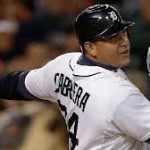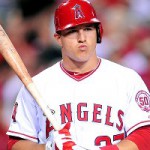Another week, another set of disappointing results for our weary Nats (losing two games in San Diego? come on), coupled with a troubling set of injuries, and Nats fans are a bit nervous. Lets see what kind of questions Tom Boswell got in his weekly chat, 5/20/13 edition.
As always, I write a response here before reading his, and sometimes edit questions for clarity.
Q: You can have Stephen Strasburg or Jordan Zimmermann for the next eight years, but only one. Which do you pick?
A: Has it come to this for poor Stephen Strasburg? As I pointed out in this space last week, Strasburg isn’t any worse or different of a pitcher right now; he’s just been really unlucky this year. Despite Jordan Zimmermann‘s dominance so far in 2013, I still think Strasburg has better stuff and a higher ceiling. I’d still go with Strasburg. Boswell also goes with Strasburg based on age and the last three years stats.
Q: Nick Markakis has proven to be a solid veteran but, possibly due to injuries, not the star the Orioles envisioned when they gave him the big contract extension. Do you think this may be Ryan Zimmerman’s fate?
A: Great question. Nick Markakis has been injury plagued … but only the last two years. Before that he was very solid, rarely missed a game, and had some really good numbers. Ryan Zimmerman only has managed to play three full seasons and has missed significant time in 5 others. Zimmerman is being paid a 9 figure salary but may not really be a 9-figure player honestly. I’ll freely admit; after injuries and now his arm issue, i’ve really fallen off the Zimmerman bandwagon. So yes, in a way I agree with the questioner. Boswell sort of agrees too.
Q: Is it time to really worry about the Nats? The most errors in the majors, the hitting remains spotty at best, and they can’t score enough runs to win when their best pitchers give extra-quality starts.
A: I’m definitely worried. They should have swept the Cubs. There’s no dishonor in losing to two Aces in Los Angeles (Kershaw and Greinke), but then to come to San Diego and lose to a no-name journeyman in Eric Stults and a rookie in Andrew Cashner (no matter now promising he may be), is troublesome. They now travel to San Francisco with no pitching advantage in any of the three games and look like they could easily get swept the way they’re hitting. Of course, that being said, I must also remind myself of my 4/24/13 post that talked about our very tough early schedule … and remind myself that the Nats go 8 weeks in June and July without playing a playoff team. So we just have to scuffle around .500 until then. I’ll say this though; if we don’t go somthing like 20-8 in June, we’ll have different issues. Boswell says its May 20th, relax (paraphrasing 
Q: I’m puzzled by his use of the bullpen. Last year, every guy seemed to get an inning or two of work every few days. (Of course, last year every guy was also reliable.) The postgame analysis yesterday talked about how rusty they were and chalked it up to the starters going long. To me, it seems more about the relievers being brought in (or not) at all the wrong times. Thoughts?
A: Ah, a question after my own heart. I have complained about Davey Johnson‘s management of the bullpen twice this year already, after both Detwiler and Gonzalez had excellent efforts wasted when they got pulled too early. I’m just not getting the bullpen usage at all. In Johnson’s defense, he just hasn’t had enough blowouts (wins or losses) in order to really get his fringe guys work. Zach Duke has exactly 2/3s of an inning this entire MONTH. Stammen may be our best reliever and he’s only getting one appearance a week right now. Henry Rodriguez got only his second appearance in May in yesterday’s blow out. So yes, that’s nearly half his bullpen that is inarguably rusty. In some ways its a good problem to have; it means their starters have been going deep and there’s not been a need for 6th and 7th innings of work. Rodriguez has brought his inactivity upon himself frankly, but I think Stammen needs some of these later inning stints right now. Boswell agrees that the bullpen management has been poor this year.
Q: Is it acceptable for a manager or GM to tell a player that he is not a switch hitter at the big league level? Espinosa has always looked better from the right side of the plate. Career he is .221 from left side and .264 from right. Considering his struggles, maybe someone should tell him he’s a right handed batter. No shame in that after all.
A: A great question, one that continues to follow Danny Espinosa. He has not “turned the corner” in 2013 as some had hoped; instead he’s bottomed complete out. A 90-100 OPS+ figure is ok if you’re hitting for power; this year he’s sitting at a 33 OPS+ with an embarassing slash line. June 1st I think the hammer comes down and Espinosa goes to the bench in favor of Steve Lombardozzi. That being said, Lombardozzi isn’t exactly lighting the world on fire either right now, so maybe both guys sit in favor of Anthony Rendon or maybe even a call-up Jeff Kobernus, who has been hitting well in AAA. As for the question in hand; can a GM “tell” a player to stop switch hitting? Probably not; Espinosa has presumably never faced a top-level right hander from the right side; I’d have to think that forcing him to stop switch hitting would make him even worse. At the very least that change happens in the off-season/spring training, not in the middle of a slump. Boswell posts a very eloquent answer about what the team may do with Espy/Lombo but doesn’t answer the core question. Maybe it isn’t answerable.
Q: Nats pitchers giving away Stolen Bases: This is getting ridiculous. It has been a serious problem since last year, known to everyone. Didn’t anyone of the pitching staff work on this in the off-season?
A: The coaching staff said they did. I havn’t really noticed. Lets runs some quick numbers out of Baseball-Reference.com:
| 2012 Starter SBs | SBs | CSs | SB% |
| Strasburg | 14 | 2 | 88% |
| Gonzalez | 12 | 1 | 92% |
| Zimmermann | 10 | 2 | 83% |
| Jackson | 7 | 5 | 58% |
| Detwiler | 3 | 2 | 60% |
Yes, the rotation last year generally speaking was not holding runners on.
| 2013 Starter SBs to 5/20/13 | |||
| Strasburg | 5 | 1 | 83% |
| Gonzalez | 2 | 2 | 50% |
| Zimmermann | 5 | 1 | 83% |
| Haren | 2 | 0 | 100% |
| Detwiler | 1 | 0 | 100% |
| 2013 Starter SBs extrapolated full season | |||
| Strasburg | 18.3 | 3.7 | 83% |
| Gonzalez | 7.3 | 7.3 | 50% |
| Zimmermann | 18.3 | 3.7 | 83% |
| Haren | 7.3 | 0.0 | 100% |
| Detwiler | 3.7 | 0.0 | 100% |
So, Strasburg isn’t appreciably improving in this regard, but Gonzalez has really worked on it. Zimmermann looks about the same. Haren is not quite as good historically as Jackson at holding runners, but the variations in the factors may have something to do with that as well. All in all, I don’t think its as bad as it was last year. Boswell’s answer verbatim: “They worked on it. They ain’t fixed it.”
Q: Just looking at Strasburg’s pitching in comparison to other elite speedballers in the league and I find one glaring item: the speed of his pitches in relation to the fastball . His off-speed pitches seem to hover too close to his fastball. Verlander, Wainwright, Kershaw, et.al., all throw 90’s fastballs, 70-85 curve and change-ups. Is this something that is missing from his arsenal?
A: Is this true? Lets do a little Pitch F/X analysis. All these numbers are average speeds for the pitch type for 2013 only for the pitchers named in the question plus a handful of other hard-throwers:
(Quick glossary lesson for pitch F/X: FA = 4-seam fastball. FT = 2-seam fastball. SI = Sinker, usually ends up being the same thing as a FT. CU=Curve, SL=Slider, CH=Change up and FC = Cut-Fastball).
| FA | FT/SI | CU | SL | CH | FC | FA-CU Delta | FA-CH Delta | |
| Strasburg | 95.5 | 95.3 | 79.7 | 88.1 | 15.8 | 7.4 | ||
| Samardzija | 94.9 | 94.3 | 82.9 | 83.3 | 91.1 | 12 | 11.6 | |
| Harvey | 94.7 | 94.4 | 82.3 | 89.1 | 86.4 | 12.4 | 8.3 | |
| Zimmermann | 93.7 | 93.6 | 77 | 86 | 86.6 | 16.7 | 7.1 | |
| Verlander | 93.5 | 93.3 | 78.7 | 85.3 | 86.7 | 14.8 | 6.8 | |
| Darvish | 93 | 92.7 | 66.7 | 81.8 | 86.9 | 89.3 | 26.3 | 6.1 |
| Kershaw | 92.5 | 73.6 | 84.5 | 85 | 18.9 | 7.5 | ||
| Hernandez | 91.1 | 91.4 | 80.5 | 84.2 | 88.7 | 91.9 | 10.6 | 2.4 |
| Wainwright | 90.9 | 90.6 | 74.9 | 83.7 | 87.3 | 16 | 7.2 |
Strasburg’s delta between his curve and his fastball is 15.8. That’s an almost identical delta to Wainwright and is better than Verlander. Kershaw‘s delta is ridiculous, but his curve is also his signature pitch. Meanwhile Darvish‘s curve is almost comedically slow and he rarely throws it. Strasburg’s Fastball-Change up delta is also very consistent with the top pitchers in the league, and is “better” than the likes of Verlander and Darvish.
So, I’m calling BS on this question. I don’t see any problem with Strasburg’s arsenal or the delta between his pitches. He throws a ridiculous, unhittable 88 mph circle change that breaks a foot; ask yourself whether or not MLB hitters want to see that pitch right after the see him hump it up to 98mph. Boswell says his stuff is fine and give some similar numbers, including some Vertical and Horizontal pitch F/x discussion that I only alluded to.
Q: What Logic did Davey have leaving both Haren and Mattheus in past their effectiveness. Haren? Well okay, sometimes he shapes up as the game goes on. HOWEVER! Leaving Mattheus in for that long when he kept getting pinged and dinged was ridiculous! Was this essentially a forfeit to save the bullpen for when Duke pitches tonight?
A: The chances of a team overcoming a 6-7 run deficit are astronomically low. So much so that most teams just go into autopilot once a big enough lead is opened up by either team. That’s why there’s so many “unwritten rules” regarding doing things with big leads; guys are mentally checked out and just trying to avoid the embarassment. The same can be said for bullpen use. Once one guy gets hammered, if the next guy does too you just kind of throw in the hat and just let guys work it out. What use would it have been to replace Mattheus after the Padres had scored 12 runs? You let the guy work on his craft, get some innings in, and move on to the next game. Boswell says, yes this was basically Johnson giving up.
Q: Boz, my 13-year-old is convinced that the Nats are finished (and that he could play second base better than Danny Espinosa, but that is another story). Baseball seasons are long, and Dad is confident but quietly getting concerned with the way the records look in the NL that a second-place finish in the NL East will not result even in a wild card. At this point in the season, what things do we really know with certainty about this team?
A: What do we know? I think we know the following:
- We still have 4 very good starters (Gio will get it back and post another 120 ERA+ season).
- We know Haren is a weakness
- We know Harper is no one-season wonder and is improved.
- But we also know that Harper has not been the same since his first injury scare about a month ago.
- We know we have some issues on defense and in the bullpen, and have all year.
- We know our schedule gets easier.
- But we also know that the Braves have cooled off and despite our iffy run we’re just a couple games out of first place in our own division.
- I don’t trust either Pittsburgh, Arizona or Colorado to continue to play even .500 ball, so I’m not worried about a 2nd wild card coming from a weird place.
- And lastly, we know there’s a lot of baseball to be played.
Boswell talks about our starters and Harper, and the re-iterates my last point. There’s 100 games to play!
Q: Did the addition of Soriano contribute to Storen’s struggles?
A: I think it had to; after a demoralizing game 5 loss the team replaces you and demotes you in the off-season. Wouldn’t you struggle in your job if that happened to you? I think we’ve talked about this before so I won’t go into great detail. Boswell’s heart wasn’t in the answer either; he just noted that Storen’s first save since his Game 5 meltdown was this week.
Q: Seems like you left out what may be the sanest idea for the Nats’ offensive woes in your column: move Rendon to second base permanently and call him at the All Star break if he’s still mashing at AA and Espinosa still can’t hit a slow pitch softball.
A: He did, but I didn’t; see above. Boswell admits this is eventually going to be an option.
